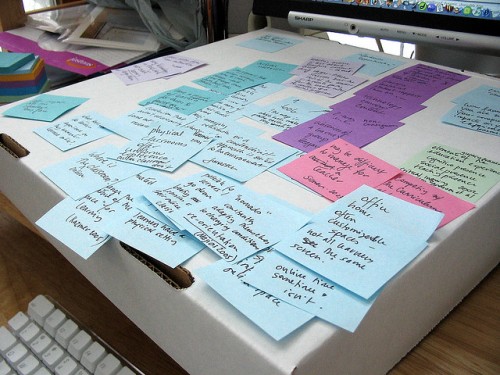
One of the most desired qualities in a successful delegate is the ability to articulate their position clearly throughout the conference. In simple terms, delegates should be effective orators, no arguments there. Good speaking skills, however, although useful to have, will not guarantee your position as the best delegate. In many cases, a delegate’s ability to speak will not give them a solid edge over other delegates. Surprised? A best delegate exerts his or her influence in all spheres of the conference, including the subtleties that many others would choose to ignore. In this four part series, I seek to elucidate upon these subtleties that could help you turn from being a good delegate to the best delegate in your committee. In the first part of this series, I will talk about how you can optimally use note passing to your benefit.
Imagine yourself walking into a committee of about 120 delegates; how can you stand out? Strong public speaking skills, though helpful, won’t suffice. There must be a significant number of brilliant speakers in the crowd, and, no matter how many times you raise your placard (even with utmost vigor), you may hardly get recognized due to the sheer size of the committee you’re in. You can, however, use items from your delegate ‘utility belt’, which includes the underrated power of note passing. Note passing to a delegate is comparable to what batarangs are to Batman; it is an indispensable skill to have.
Proper usage of note passing can be done in several ways:
1. Appreciate, don’t depreciate: Let’s face it, we cannot truly resist flattery, and you can use this to your advantage. Compliment other delegates based on their speeches, questions or even resolutions by sending them appreciative notes. This is a good tactic to use especially when you need more allies on your side. Appreciation from your side leads others to believe that you’re a likable person, which is certainly an asset to have.
2. Question the chair on proceedings: Wait, what is the purpose of the ‘point of parliamentary inquiry’? Yes, it is to ask the chair on debate proceedings. However, not all chairs entertain the idea of interrupting debate for the sole purpose of answering a single delegate’s question. Unless it is an urgent question that requires an immediate answer, send your question in the form of a note to the chair. This keeps debate flowing and you get your question answered as well. This same tactic is applicable in place of a ‘point of personal privilege’.
3. To form blocs: The moment you spot a delegate with parallel view points, notify him or her with a note asking for a meet-up during an unmoderated caucus. This is extremely useful. If you take the initiative of inviting delegates to your bloc, via notes, you will save a lot of time and effort. You won’t have to go through the hassle of searching for ‘bloc mates’ during unmods. And, since you took the initiative, you will automatically become the leader of the bloc.
Purposes you should NOT use note paper for:
1. To ask long questions: This is a very common observation I’ve made. After delegates finish their speeches, they are often faced with a plethora of questions in the form of notes. These questions are usually very long and are rarely paid heed to by the receiver, so don’t waste your time writing paragraphs on your note paper. It would be wiser to utilize your unmoderated caucus time to discuss such lengthy issues and concerns.
2. To respond to slander: Often, when delegates represent powerful countries, they are subject to slander in the form of notes. These notes may disparage the country’s policies or motives, but when delegates respond to these notes by writing equally harsh responses, then they are not only wasting their time, but also preoccupying their minds with what is not important. Notes filled with criticism should be ignored and forgotten. If slander is a repeated issue during a committee session, you may want to consider discussing it with your chair.
3. To keep up with committee gossip: I know, it’s tempting to find out who the delegate of France is going out with for the delegate dance, but please don’t waste note paper to do the same. You can answer these nonsensical, yet need-to-know questions over lunch or dinner. Have faith in delayed gratification.
I hope you’ve gained some vital tips by reading this article. Do keep an eye out for the remainder of the series; the second part of this series talks about what tactics you can use during unmoderated caucuses.

